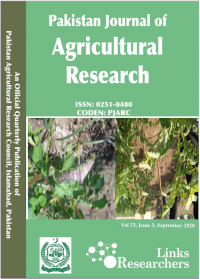Strategies for the Management of Saline Water for Rice-Wheat Crops in Saline-Sodic Soil
Strategies for the Management of Saline Water for Rice-Wheat Crops in Saline-Sodic Soil
Muhammad Sarfraz1*, Muhammad Amjad Qureshi2, Muhammad Arshad Ullah3, Shahzada Munawar Mehdi4, Abdul Rasool Naseem1, Sarfraz Hussain1, Muhammad Qaisar Nawaz1 and Muhammad Rizwan1
ABSTRACT
Amelioration of salt prone areas and reuse of saline/ sodic water is becoming important tool to improve the crop production as well as to decrease the disposal of such water. More land can be brought into cultivation by using poor quality ground water. Poor quality water can be used for cultivation of crops with appropriate management viz. chemicals like gypsum, H2SO4, calcium chloride, sulfur or organic additions like manures, muds, biogas slurry, composts etc. The marginal soils irrigated with saline water have deteriorated physical properties were improved with inorganic and organic amendments. Field studies were conducted at Kot Murad (district Hafizabad) to evaluate the different management practices for saline water in salt affected soils. Results suggested that the canal water with soil GR produced the maximum yields of rice and wheat trailed by the application of saline water with GR of soil and irrigation water. Soil analysis at harvest showed that soil was improved with canal water with GR of soil trailed by saline water with GR of soil and irrigation water. The least variations in soil pH, EC and SAR were observed in control where nothing was applied. Comprehensive studies in different ecological zones with salt affected soils with variety of saline water may be grown to confer these approaches.
To share on other social networks, click on any share button. What are these?






